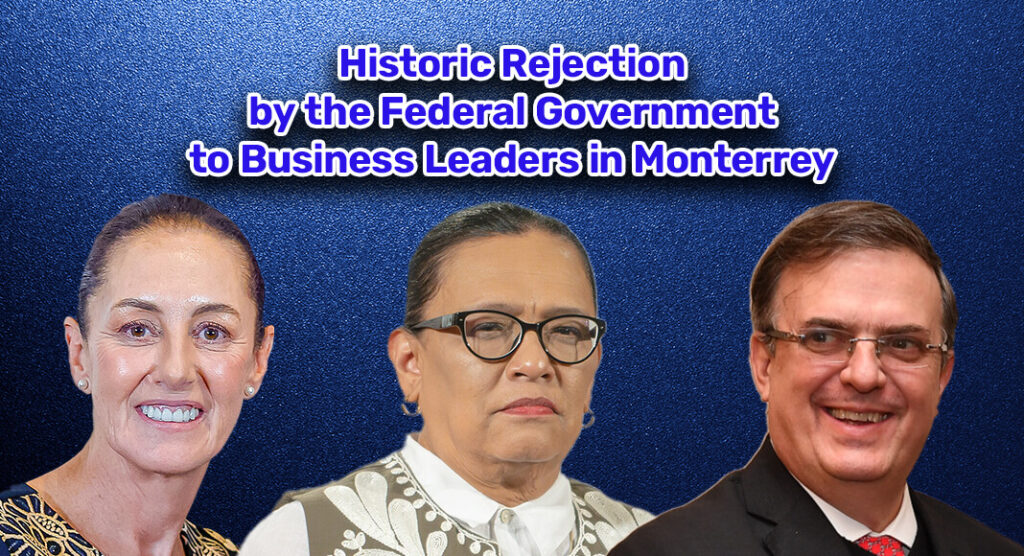
Rosa Icela Rodríguez, Secretary of the Interior. Photo by EneasMx, under CC BY 4.0, via Wikimedia Commons.
Marcelo Ebrard, Secretary of Economy. Photo by U.S. Department of State, in the Public Domain.
Texas Border Business
In an unprecedented event, more than a thousand business leaders from across the country gathered in Monterrey, Nuevo León, for the Annual Meeting of Industrialists, a key forum in Mexico’s economic agenda. Held on October 21, 2024, at the Cintermex Convention Center, the event brought together the country’s leading business chambers under the Confederation of Industrial Chambers (CONCAMIN) umbrella. With a hopeful theme, “Industry as a Driver of Prosperity and Well-being,” the entrepreneurs eagerly anticipated a dialogue with Claudia Sheinbaum’s newly inaugurated government about the challenges and opportunities facing the Mexican economy, particularly in light of global phenomena such as nearshoring and the revision of the USMCA.
However, the mood quickly turned somber. Despite the announced participation of several cabinet members, including Marcelo Ebrard, Secretary of Economy, and Rosa Icela Rodríguez, Secretary of the Interior, none attended the event. The opening ceremony, which was expected to be led by President Sheinbaum, was one of the major absences of the day. Key speeches and panels had to be canceled or modified due to the lack of official government representation.
The most notable blow was the cancellation of Ebrard’s keynote speech, titled “Mexico Facing the Challenges of the Global Context,” a crucial topic for industrialists seeking to position the country in the international value chain. Instead, Ebrard sent a brief 59-second video message, a gesture perceived as a sign of the new government’s lack of interest in strengthening its relationship with the productive sector.
The dismay among attendees was palpable. Business leaders such as Alejandro Malagón, president of CONCAMIN, Francisco Cervantes, president of the Business Coordinating Council, and Máximo Vedoya, president of CAINTRA Nuevo León, had hoped to exchange views with authorities on key public policies that directly affect the country’s economic future. Instead, they were met with an institutional void. The snub felt like a cold shower for an event that brought together more than 500 business leaders representing 46 national and 14 regional chambers.
The implicit message from the government was clear: priorities lie elsewhere. Not only was a valuable opportunity to strengthen dialogue with the productive sectors missed, but a worrying distancing signal was sent at a critical moment for the national economy. Industrialists contribute 85% of the country’s total investment, while the public sector accounts for just 15%. In a context where the country faces the potential for an economic downturn in 2025, the government’s support for those who create jobs and drive growth is more crucial than ever.
Unofficial explanations quickly began to circulate, but whatever the reason, the government’s absence left a bitter taste among the attendees.
This snub has immediate implications and raises questions about the future relationship between Claudia Sheinbaum’s government and the private sector. While former President Andrés Manuel López Obrador had disagreements with business leaders, such an overt display of indifference had never been seen before. Mexican industrialists, primarily responsible for investment in infrastructure, innovation, and job creation, expected an approach to generate confidence in this new political cycle. Instead, they received a message of indifference that could affect the country’s investment climate.
The basic diplomatic protocol would have required at least one cabinet secretary to be present to represent the new government at this critical event. Yet, that diplomacy has to materialize. In light of this, doubts arise about whether Sheinbaum’s government is more inclined to interact with large corporate conglomerates or whether it is distancing itself from those who have long been the country’s economic engine.
The disconnect in Monterrey is a worrying sign. At a time when the global economy faces unprecedented challenges and Mexico has the opportunity to capitalize on nearshoring, dialogue between the government and the private sector is more important than ever. Ignoring industrialists is not only a strategic mistake but also sows uncertainty about the country’s economic path in the coming years.














